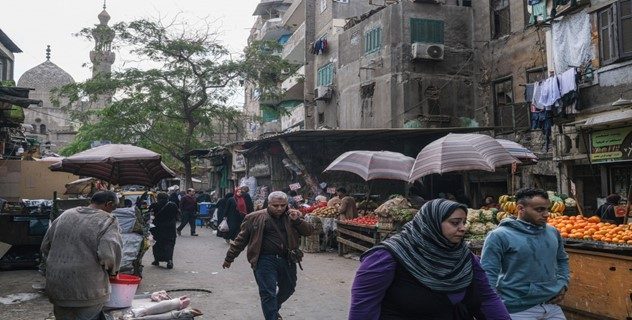
Inflation in urban parts of Egypt rose to its highest in five years, seven months -since July 2017- pulled by a surge in food prices linked to the devaluation of the country’s local currency, reported Bloomberg.
Consumer prices climbed an annual 32.7% in March, less than forecast by most economists and up from 31.9% the previous month.
It was driven upwards by a 62.9% rise in food and beverage costs, the state-run statistics agency CAPMAS said Monday.
On a monthly basis, prices grew 2.7%, compared with 6.5% in February.
Yet even as price increases quickened, they did so at a slower pace than the month before, a development that’s in part a result of statistical effects because declines in the currency a year ago created a high base of comparison.
Behind the acceleration is a recent plunge in Egypt’s pound that’s filtering through the economy.
A hike in fuel prices and rising demand around the holy month of Ramadan, which began in the fourth week of March and is marked by large meals and gatherings, were among other contributing factors.
Egypt, a major importer of wheat and other commodities, has devalued its pound three times over the past year, driving up the cost of most foreign-origin goods already under pressure from trade restrictions and the economic fallout of Russia’s invasion of Ukraine.
Soaring prices are an especially painful blow in the Middle East’s most populous country where about half its 104 million people live near or below the poverty line. The government has said tackling the issue is a top priority.
The central bank on March 30 raised interest rates by 200 basis points in its latest bid to contain price pressures.
It was the year’s first hike after the regulator hit pause in February, saying it was assessing the impact of a wave of increases in 2022.
Higher rates, though, offer little in the way of an immediate solution for a country facing its worst foreign-exchange crisis in years.
Pressure is building again on the pound as Egypt races to find foreign investment to tackle its external funding gap, including through an ambitious plan of selling stakes in at least 32 companies.
Dollar crisis
Due to the dollar crisis that the country is suffering from, there is an acute shortage of medical supplies.
Egypt’s hospitals are being forced to deal with a critical shortage of essential medical supplies because of a lack of dollars to clear imports held up at the nation’s ports, reported The National.
According to an official of the Cairo Chamber of Commerce, shipments of medical products, as well as materials needed for their manufacture locally, have been held up at various ports since January.
“We all know the problem is that banks at this time can’t secure the necessary sums in US dollars for most imports,” Mohamed Ismail, head of the chamber’s General Division for Medical Supplies, told CTV on Wednesday.
“But medical supplies are outside the realm of negotiation. They are essential and we simply cannot do without them. They should be made a priority.”
Mr. Ismail said importers have deposited payments for the goods at various banks but these were in Egyptian pounds under local banks’ instructions.
The General Division for Medical Supplies said it had made an urgent appeal to Egypt’s central bank to renew its instruction to local banks to prioritise allocation of their dollar resources to securing essential goods.



